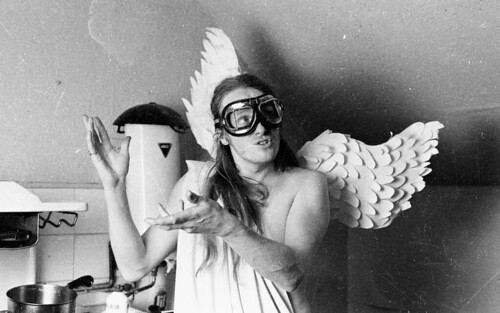Found this tatty old negative. Self-portrait taken about 23 years ago in my bedsit in London. The inclusion of kitchen sink is deliberate. I have left the dust and scratches on, as I like the effect.
Clearly there was something slightly wrong with me back then. I even made those wings myself. Could be this year's Christmas card.
On another blog, FideCogitActio, some theists of a "classical" stripe (that's to say, like Brian Davies, Edward Feser) are criticisng the Evil God Challenge (or I suppose, trying to show how it can be met, or sidestepped). The main post includes this: In book I, chapter 39 , Aquinas argues that “there cannot be evil in God” (in Deo non potest esse malum). Atheists like Law must face the fact that, if the words are to retain any sense, “God” simply cannot be “evil”. As my comments in the thread at Feser’s blog aimed to show, despite how much he mocks “the privation theory of evil,” Law himself cannot escape its logic: his entire argument requires that the world ought to appear less evil if it is to be taken as evidence of a good God. Even though he spurns the idea that evil is a privation of good, his account of an evil world is parasitic on a good ideal; this is no surprise, though, since all evil is parasitic on good ( SCG I, 11 ). Based on the conclusions of se...

Comments
its all good....